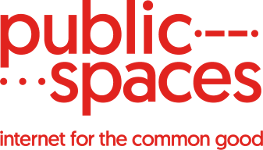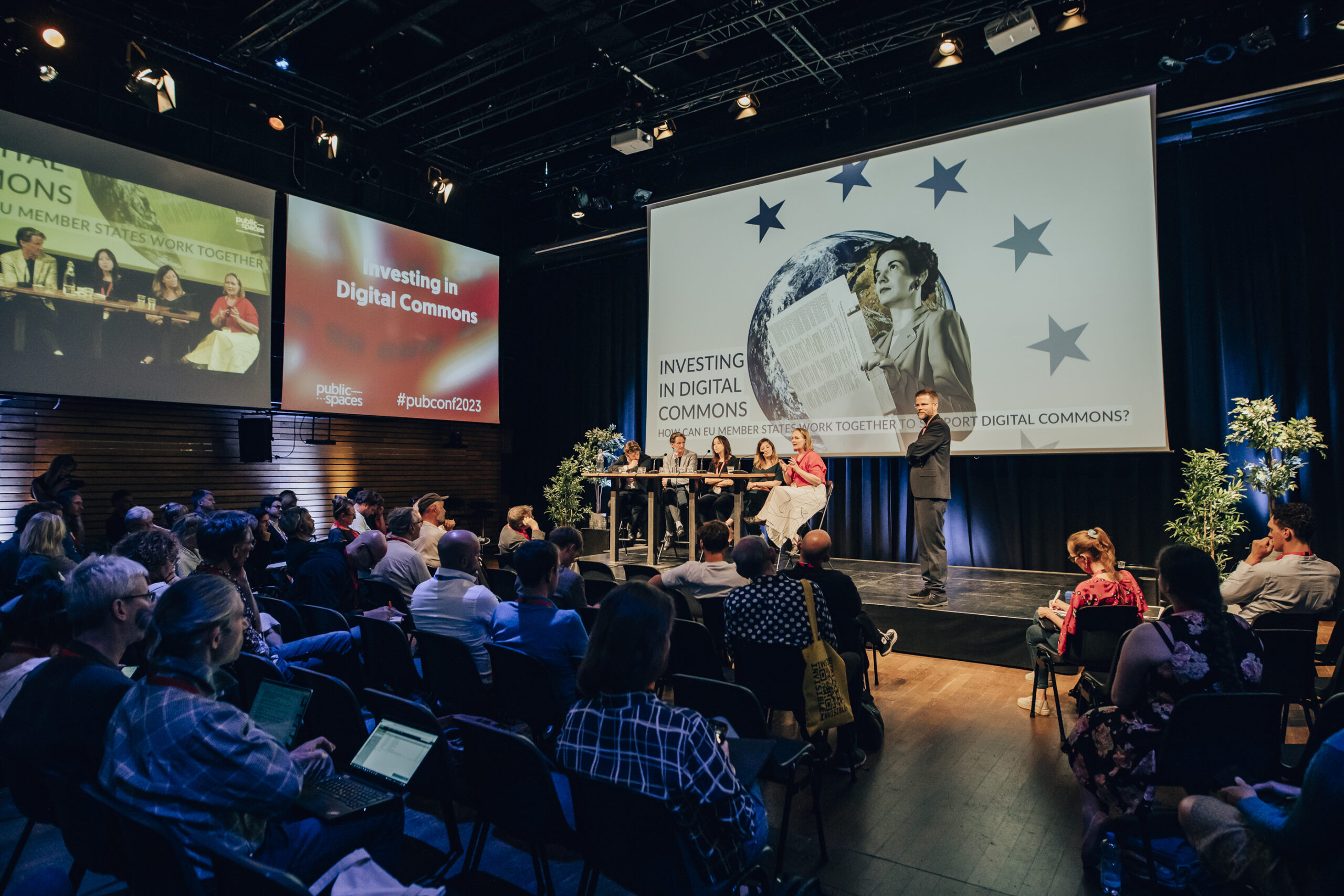Program
- Welcome & introduction by moderator Clarice Gargard
- About the PublicSpaces conference. What is PublicSpaces about? Why? What impact do you hope for?
- Keynote Prof. Dr. José van Dijck: The dependence of big tech and it's dilemma's for the public sector
- Setting the stage, setting the agenda. Moderator in conversation with different speakers and participants of the day. About strategies to work towards a public internet, ways to strengthen the public stack, desirable outcomes of the conference
- Outline of the programme. Jan Hein Hoogstad (one of the programmers) talks about the programme and practicalities.
Speakers
Recap
The introduction was about the intersectional experiences of a black woman on the internet. The main question for the day: How to get towards a more common internet?
Sander thought the conference is at the right moment because the impact of technology on our lives is growing and it is becoming more clear how this impact is not positive. We are now at a time that we can take action towards an internet that does violate privacy and human rights. Leonieke stressed that it is a process and that this is the beginning of a movement and a starting point of the transition. Today is about knowledge sharing and network building. This is also a national and European project.
Sander hopes that the result of today will be that we build connections and that we convince people that they should be more critical of the current state of the internet and that we can be optimistic about making the digital public spaces a reality.
Keynote by Jose van Dijck (view slides here): the need for public space on the internet. Public spaces such as shopping streets, town squares, schools, and libraries are all being gate kept by big tech corporations such as Google, Microsoft, Amazon, Apple, and Facebook. Main resources such as data are being privatized and there is a lack of public infrastructures that governments can rely on. The internet is controlled by private companies, but where is the space for the public sectors? Some public spaces are more equal than others. Platformization is the process that gives the power to big tech corporations to gatekeep the spaces on the internet. Three recommendations to go against this platformization:
- Protect vital digital infrastructure: These are the roots of the tree, for example, The Good Cloud or Gaia (German). These can be used to build more open public spaces.
- Create public alternatives. The trunk of the tree. We need to develop non-profit independent alternatives that allow the users to keep control of their own data. Public spaces is here to "make things happen".
- Collaboration between public sectors. The branches of the tree. Need to work together with the education and health sectors, because there is an urgent need in all the sectors and they all have their own expertise to add.
How to promote collaborations that have an impact? How to scale up small, nonprofit alternatives? How to connect makers and organizations? What support can we expect from national and EU policymakers?
Back at the table: there is a lack of diversity and what we really need is to be able to choose between public spaces. This is also what Eli Pariser talked about on Thursday. "We need to go back to the very idea of what a public space is and what it means for civil society and private sectors."
Kees: the key issues are power and the way that values change in the way they interact with each other, e.g. privacy needs to be sacrificed for security. This was not enough on the agenda in politics, because the internet is partly invisible, very complex, and crosses boundaries. So politicians did not know where to start and it was difficult to do something about it.
Wilko: the fact that we are talking about it is a sign of the times that we are living in. In the media world, they use these platforms to broadcast their content, so the tradeoff between wide reach and privacy of users is a difficult decision.
Jan Hein: there are many different types of values that need to be taken into account. Education finds different sets of values important than the media or politics. So the first step is to have a conversation between sectors and align.
Kees: the balance between the values is changing. José: public values need to be negotiated and discussed.
Kees: the big tech companies have too much power and cannot be controlled.
Jan Hein: we shouldn't talk about "Big Tech" like this because it gives them too much power and makes them seem very big. We should talk about them as we talk about other companies that can be controlled.
Sander: the way that technologies are built does not fit our democratic models, unlike all other products we use. We need to embed the platform within our democratic structures and make sure they are open, democratic, and inclusive.
Clarice: but companies such as Facebook can also be seen as a platform for creating democratic and open spaces. Sander: you can demonstrate that these claims are not true. They will not tell you how the algorithms work, the underlying business model. Kees: they use a different definition of 'open', but the public should define what 'open' means.
Sander: it is important that we collaborate on a European level. But there is a lot we can do in the Netherlands.
Show notes
- 'Seeing the forest for the trees: Visualizing platformization and its governance', José van Dijck.
- Slides of the presentation by José van Dijck
- The Good Cloud
- Gaia
Evenement tijdschema's (1)
Main track Friday
-
What is the PublicSpaces Conference about and what do we want to achieve? In the opening we will introduce this conference. Prof. dr. José van Dijck gives a keynote speech and through a panel session we set the agenda.


Geef een reactie